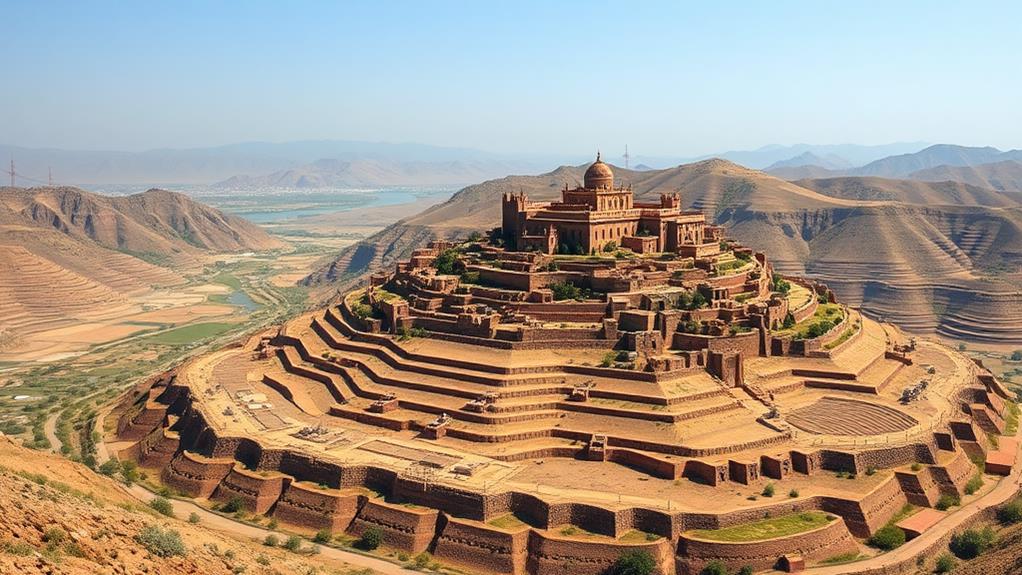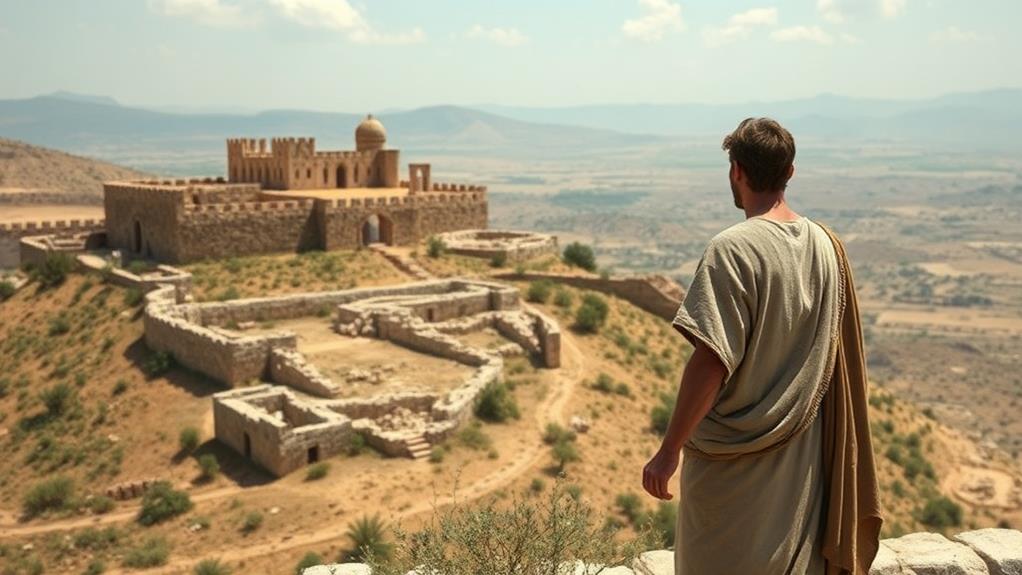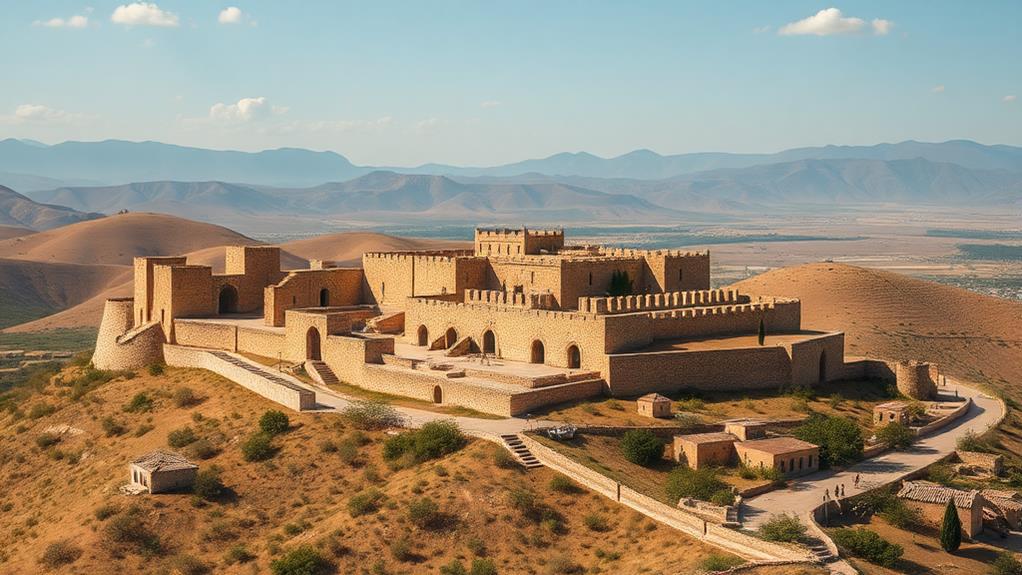Keilah Name Meaning in the Bible
Keilah, a name of Hebrew origin, signifies “citadel” or “fortress,” embodying themes of protection, strength, and refuge. In the Bible, Keilah is mentioned as a strategic city in the lowlands of Judah, allocated to the tribe of Judah in territorial divisions. Its significance is deeply intertwined with David’s journey, who rescued Keilah from the Philistines and later fled after learning the inhabitants would betray him to Saul. This narrative underscores the importance of trust in God’s guidance and the contrast between David’s reliance on divine direction and the disloyalty of the people of Keilah. By exploring Keilah’s role in the Old [TEXT], one can discover deeper lessons on faith, perseverance, and spiritual growth.
Key Takeaways
- Biblical Name Meaning: Keilah’s Hebrew name means “citadel” or “fortress,” symbolizing strength, protection, and refuge.
- Geographical Context: Keilah was a strategic and fortified city in the Shephelah region of Judah, mentioned in Joshua 15:44 and 1 Samuel 23:1-8.
- Historical Significance: Keilah’s name reflects its historical role as a strong and protected city, crucial in the biblical narratives of David and Judah.
- Symbolic Importance: The name Keilah emphasizes themes of divine guidance, protection, and spiritual strength in the biblical narratives[BACKGROUND].
- Spiritual Lesson: The name Keilah teaches the importance of trust in God’s guidance and the need for faith in overcoming challenges, as seen in David’s journey[BACKGROUND].
Keilah in Biblical Geography

Keilah is first mentioned in Joshua 15:44 as one of the Canaanite cities allotted to Judah. It was a fortified city with gates and bars, which David rescued from the Philistines‘ attack during his wanderings (1 Samuel 23:1-8).
However, the inhabitants of Keilah later sought to deliver David to Saul, prompting him to escape to the wilderness of Ziph. This event underscores the strategic and fortified nature of Keilah, a significant feature in the biblical geography of Judah.
The historical and archaeological evidence supports the importance of Keilah, with mentions in the Amarna letters and its designation as a place of continuous settlement from the Bronze Age to the Crusader and Mamluk periods.
Historical Significance of Keilah
Frequently mentioned in historical texts, the city of Keilah holds significant strategic and cultural importance in the biblical narrative. Located in the Judean plain, Keilah was a fortified city that played a pivotal role in the early history of Israel, symbolizing the themes of spiritual freedom in Christ and divine guidance. Its significance is highlighted in 1 Samuel 23, where David, fleeing from King Saul, received word that the Philistines were attacking Keilah.
David’s inquiry and subsequent rescue of Keilah demonstrate God’s guidance and protection, underscoring the city’s importance in the biblical narrative.
Keilah’s impact extends beyond its immediate biblical relevance, reflecting broader themes of God’s faithfulness and the importance of seeking divine guidance. The city’s participation in the reconstruction of Jerusalem’s walls, as recorded in Nehemiah 3:17-18, further emphasizes its historical significance.
Keilah’s story serves as a reflection of the enduring power of faith and unity, offering lessons for modern Christians on the importance of trust, cooperation, and reliance on God’s direction. Through its rich biblical history, Keilah remains a powerful reminder of God’s faithfulness and protection, a legacy that continues to inspire and guide believers today.
Symbolism of the Name Keilah

The name Keilah, derived from the Hebrew word for “citadel” or “fortress,” embodies themes of strength and protection that are central to its biblical significance. This symbolism is particularly evident in the narrative of David’s rescue of Keilah from the Philistines, where God’s guidance and protection are underscored.
In this instance, Keilah symbolizes a place of refuge, much like the spiritual significance of names that emphasize divine protection and purpose. The name Keilah in this scenario serves as a powerful reminder of God’s role as a stronghold and refuge, emphasizing the importance of seeking divine guidance in times of crisis.
Strength and Protection
Embodying a strong fortress, the name Keilah resonates deeply with themes of strength and protection in biblical contexts. Its Hebrew origin signifies a citadel, symbolizing a place of secure refuge and defense. This biblical inspiration draws from the city of Keilah, known for its fortified structure and strategic importance in the lowlands of Judah.
The name Keilah, akin to the biblical themes of strength and resilience, emphasizes the importance of spiritual guidance and leadership in overcoming adversity.
In the Bible, Keilah is often associated with David, who rescued it from the Philistines, demonstrating his reliance on God’s guidance and strength. The city’s significance is further highlighted in its mention in the Book of Joshua as part of the Shephelah region and in the Book of Nehemiah as a district that contributed to the repair of Jerusalem’s walls.
The name Keilah conveys a powerful message of protection and resilience, rooted in biblical narratives. Its origins underscore the importance of seeking refuge and strength in times of adversity, mirroring the biblical themes of trust and fortitude. Therefore, Keilah stands as a tribute to the enduring power of faith and the pursuit for safety and security.
Biblical Significance Explained**
Symbolism in the name Keilah is deeply embedded in its biblical origins, signifying a fortress or citadel. This interpretation underscores the importance of strength and protection, hallmarking the locations and individuals associated with this name in the Old Covenant. The name Keilah appears both as a personal name and a place name, with its geographical references highlighting strategic and fortified cities. Additionally, the themes of resilience and faith echoed in the name Logan’s biblical significance further enrich the understanding of Keilah’s meaning as a stronghold.
The biblical narrative places Keilah within the lowlands of Judah, emphasizing its defensive capabilities against encroaching enemies, such as the Philistines. David’s victory over the Philistines in Keilah, as detailed in 1 Samuel 23, illustrates the city’s strategic value and the divine guidance David sought before engaging in battle.
In an interpretation analysis, the name Keilah serves as a metaphor for divine protection and human resilience. The inhabitants of Keilah, although initially saved by David, are later willing to betray him to Saul, revealing the complexities of human loyalty and the unwavering nature of divine protection. This narrative underscores the reliance on divine guidance, emphasizing the importance of seeking God’s will in the face of uncertainty.
The name Keilah, thus, embodies the themes of strength, protection, and divine intervention, making it a significant element within biblical narratives.
Spiritual Lessons From Keilah
Numerous spiritual lessons can be gleaned from the biblical account of Keilah, a city in the lowlands of Judah that played a pivotal role in David’s early career. One key lesson is the importance of spiritual growth and perseverance. David’s journey to and from Keilah is a proof of his unwavering faith and trust in God.
When David inquired of the Lord about helping Keilah against the Philistines, he demonstrated a deep trust in God’s guidance. This trust was further tested when he discovered that the people of Keilah would betray him to Saul, yet he chose to leave peacefully rather than seeking vengeance.
David’s actions in Keilah highlight the value of faith and trust in maneuvering life’s challenges. His willingness to consult God and follow His lead, even in uncertain times, is a powerful example of spiritual maturity. Additionally, the betrayal by the people of Keilah underscores the need to trust God above all else, as human loyalty can be fleeting.
These lessons serve as a powerful reminder to seek guidance from God and to prioritize faith and trust in our spiritual journeys.
Keilah in David’s Journey

Keilah, a fortress city in the lowlands of Judah, played a pivotal role in David’s journey as a leader before he became king. According to 1 Samuel 23, David rescued Keilah from the Philistines’ attack, saving its inhabitants, only to discover later through divine guidance that the same people would betray him by delivering him into King Saul’s hands.
This episode not only highlights David’s reliance on God’s leading but also underscores the contrast between David’s faithfulness and the disloyalty of the inhabitants of Keilah.
Keilah’s Geographical Significance
Frequently referenced in biblical narratives, the city of Keilah holds significant geographical and historical importance. Its strategic location within the Shephelah, the lowland region of Judah, made it a crucial site for the Israelites and the Philistines during their conflicts. Keilah’s geographical significance is underlined by its position near the chalk trough, an important geographical feature that facilitated a north-south route between the hill country and the Shephelah.
In the biblical conquests, Keilah was allocated to the tribe of Judah as listed in Joshua 15:44, emphasizing its role in the territorial divisions of the Promised Land. The city’s location controlled the main road from the coast to Jerusalem, making it a vital stronghold during David’s reign.
Keilah’s participation in the rebuilding of Jerusalem’s walls under Nehemiah’s leadership further highlights its importance as a district in the post-exilic period. The site’s archaeological findings, including fortified walls and towers, corroborate its status as a significant city throughout ancient Israel’s history.
The interplay between Keilah’s geographical landmarks and its biblical narratives underscores the city’s pivotal role in the historical and cultural landscape of the region.
David’s Rescue and Betrayal**
In the midst of his tumultuous flight from King Saul, David received word that the Philistines were attacking Keilah, plundering its threshing floors and terrorizing its inhabitants. Despite the risks and uncertainties, David chose to seek divine guidance before intervening. Twice, he inquired of the Lord about rescuing Keilah, and upon receiving a positive response, he led his men to victory, defeating the Philistines and saving the city.
This daring rescue exemplifies David’s trust in God’s guidance and commitment to protecting the innocent. However, the leaders of Keilah did not reciprocate David’s loyalty.
When Saul learned of David’s whereabouts, he planned to besiege the city to capture him. God revealed to David through priest Abiathar that the Keilahites would betray him, prompting David to flee and evade Saul’s pursuit.
David’s victory over the Philistines and subsequent betrayal by the Keilahites underscore the themes of divine guidance and human disloyalty. Despite facing betrayal and adversity, David remained steadfast in his faith and reliance on God’s providence, a model of resilience and faith for all who seek to follow in his footsteps.
Biblical References to Keilah
Among the various locations mentioned in the Old Covenant, a fortified city in the Judean plain holds particular significance. Keilah, a city of strategic importance, is mentioned in the biblical books of Joshua, 1 Samuel, 1 Chronicles, and Nehemiah. Its name, meaning “citadel” or “fortress,” reflects its deep historical and theological significance.
Keilah’s significance in the biblical context encompasses its inclusion as one of the cities in the territory allocated to the tribe of Judah in Joshua 15:44. The most notable event involving Keilah is recorded in 1 Samuel 23:1-13, where David, guided by God’s promise of victory, rescued the city from the Philistines. This narrative highlights the importance of seeking God’s guidance in times of crisis, as David twice inquired of the Lord before taking action.
Additionally, Keilah is mentioned in 1 Chronicles 4:19 as part of the genealogies of Judah, underscoring the importance of lineage and heritage. Later, in Nehemiah 3:17-18, the inhabitants of Keilah participated in the reconstruction of Jerusalem’s walls, demonstrating their commitment to unity and restoration.
The Etymology of Keilah

The name Keilah itself holds profound meaning within its Hebrew origin, which is crucial in understanding its significance in the biblical narrative. Derived from the Hebrew word \(Qəʿilā\), Keilah literally means “citadel” or “fortress,” suggesting a place of defense and resilience.
Through linguistic analysis, we can explore the deeper connotations of this name. Its association with fortification and protective strength underscores its role in biblical accounts, particularly in 1 Samuel, where Keilah is a city saved by David from the Philistines, only to later pose a threat to his safety due to its inhabitants’ willingness to betray him.
In biblical interpretation, the name Keilah represents not just a physical location but also a metaphorical concept. Its designation as a fortress or citadel speaks to the themes of protection, security, and the people’s relationship with God. This, in turn, highlights the contrast between David’s reliance on divine guidance and Saul’s self-centered actions.
Keilah’s Role in the Old Testament**
Frequently mentioned in the Old Scriptures, Keilah plays a pivotal role in several narratives, most prominently in 1 Samuel and Joshua. Its significance is underscored by its role as David’s refuge and a site of strategic defense against the Philistines.
In 1 Samuel 23, David learns of the Philistines’ assault on Keilah and their plundering of the threshing floors. Despite his men’s fears, David inquires of the Lord and receives assurance that he will deliver the Philistines into his hand. David’s subsequent victory over the Philistines not only saves the inhabitants of Keilah but also highlights the city’s strategic importance.
Keilah’s defense and David’s actions offer valuable biblical lessons. David’s reliance on God and his willingness to act in faith, even in the face of uncertainty, demonstrate the power of trust and obedience. The narrative also underscores the importance of humility and forbearance, as David chooses to leave Keilah upon learning that its inhabitants would betray him to Saul.
The story of Keilah serves as a symbol to the enduring themes of faith, courage, and leadership that permeate the Old Testament.
Frequently Asked Questions
Is Keilah Used as a Given Name in Modern Times?
Yes, Keilah is used as a given name in modern times, showing varied popularity trends across different sources. It holds cultural significance derived from its Hebrew origins, meaning “citadel” or “strong tower,” symbolizing fortitude and strength.
How Does the Biblical Location of Keilah Relate to Its Modern Archaeological Site?
Amidst the vast, grand hills of Judea, lies the ancient bastion of Keilah, its ruins a tribute to its biblical importance. The archaeological site at Khirbet Qila unravels its storied past, revealing the city’s fortified walls and strategic value.
Are There Any Mentions of Keilah in New Testament Texts?
New Testament References to Keilah:
There are no direct mentions of Keilah in New Testament writings, as it primarily appears in Old Testament narratives, specifically in Joshua, 1 Samuel, 1 Chronicles, and Nehemiah, discussed in the context of its biblical history.
What Are the Historical Periods During Which Keilah Was Inhabited?
Revealing the tapestry of time, Keilah’s history unfolds. Ancient settlements and archaeological evidence disclose that Keilah was inhabited from the 14th century BCE, as mentioned in the Amarna letters, through post-Exilic times, as noted in Nehemiah 3:17-18.
Are There Different Pronunciations or Variations of the Name Keilah?
The name Keilah has variations such as Kaela and Kayla, with multiple pronunciations including KEE-lah and KAY-lah. These differences reflect diverse cultural and linguistic influences, offering individuals freedom to choose their preferred expression and identity.
Figures of Resilience and Wisdom
- Naomi Name Meaning in the Bible
- Keilah Name Meaning in the Bible
- Jesus Name Meaning in the Bible
- Grace Name Meaning in the Bible
- Sapphira Name Meaning in the Bible
Conclusion
Keilah, a city in the lowlands of Judah, symbolizes strength and resilience. Its historical significance is rooted in David’s pivotal victory over the Philistines, followed by his departure due to the inhabitants’ unfaithfulness. The name Keilah, meaning “citadel” or “fortress,” underscores its fortified nature. This narrative teaches valuable lessons on trust, loyalty, and divine guidance. For instance, David’s reliance on God’s leading in his decisions, as seen in 1 Samuel 23:1-12, demonstrates the importance of seeking divine wisdom in challenging circumstances.






